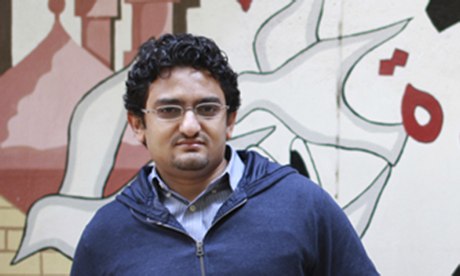
Wael Ghonim, who created the Facebook page We Are All Khaled Said, has had his private phone conversations aired by al-Kahera Wal Nas TV. Photo: Ahmed Naguib
Figurehead of 2011 uprising, now in exile, defends himself as pro-regime TV channel claims he used revolution for own gain
"One of the figureheads of Egypt's 2011 uprising says he is staying away from the country "as Egypt no longer welcomes those who are like me".
Wael Ghonim's statement comes amid claims by fellow activists that Egypt's government has returned to the authoritarianism of the pre-2011 era.
Ghonim – who is now based in the United Arab Emirates – first rose to global prominence during demonstrations that led to the fall of formerdictator Hosni Mubarak in February 2011. The founder of a popular Facebook group that criticised Egyptian police brutality, Ghonim used his considerable following on the social media site to promote the protests.
His activism led to an 11-day spell in police custody during the uprising, and despite his protestations, Ghonim subsequently became a poster boy for the revolution, both in and outside Egypt. Among many other plaudits he was one of Time magazine's 100 people of the year.
Three years on, Ghonim once again appears to be an enemy of the establishment, targeted alongside other activists in recent days by a pro-regime television channel, al-Kahera Wal Nas. In a bid to discredit him and the 2011 uprising, the channel aired some of Ghonim's private telephone conversations earlier this month. A presenter claimed the conversations demonstrated that Ghonim had used the revolution for his own gain.
In his first public statement in over six months, Ghonim returned to Facebook this week to condemn the broadcast, which he said "violated the laws and constitutions of any country in the world".
He added: "I have never been a traitor to my country, nor excessive in my principles, nor contrary to law", and said that he would be prepared to return to Egypt to defend his name should any charges be brought against him. Ghonim declined to comment further to the Guardian.
Ghonim is the latest 2011 figurehead to be targeted in recent months, as a crackdown on Muslim Brotherhood supporters of ex-presidentMohamed Morsi spread even to those secular activists who called for Morsi's overthrow last July. Ahmed Maher, Alaa Abd el-Fatah and Ahmed Douma – all high-profile activists targeted under both Mubarak and Morsi – are among hundreds of other secular and Islamist campaigners now in jail, after being convicted of breaking a new law that rights groups say severely curbs the right to protest. Eighty-seven Brotherhood supporters were jailed for three years each on Thursday, in the latest and largest round of sentencing. Journalists have also been targeted, with three al-Jazeera journalists – including an award-winning Australian broadcaster, Peter Greste – still detained after being arrested in late December.
The developments have led many leading members of the 2011 protests to express their despair at the situation. Mohamed Hashem, the head of Egypt's leading progressive publishing house, and a hero to revolutionaries, threatened to leave Egypt last year after giving up hope about the political situation. "The revolution came out of a big dream – but it wasn't this," Hashem told the Guardian at the time.
But the revolutionaries' desperation is not necessarily shared by large sections of the population, exhausted by the three years of economic and political chaos that have followed Mubarak's fall. Many may welcome a return to strong and strict governance if it comes hand in hand with economic stability – and argue that next week's referendum on a new constitution is the dawn of a new era.
Ahmad Sarhan, a spokesman for the National Movement party – headed by Mubarak's last prime minister, Ahmed Shafik – said the constitution was the first step towards turning Egypt into a modern, democratic state that enshrined the freedom of every Egyptian, including Wael Ghonim. "I don't think that's a fair narrative," said Sarhan, when asked whether the jailing of activists contradicted the goals of the 2011 uprising. "Just because a few of them committed some kind of unlawful actions, it doesn't mean it's a trend.
"The new constitution is a new start for Egypt," he argued. "It guarantees the right for Wael Ghonim and anyone to find the place they want."

No comments:
Post a Comment